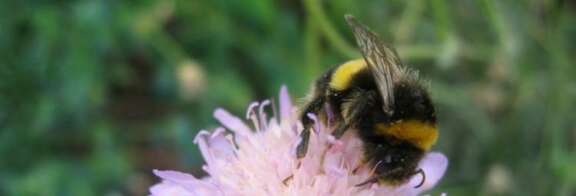Ministers reject plan for the ‘emergency’ use of banned bee-harming pesticides

Ministers have rejected an “emergency” application from the National Farmers Union (NFU) to use banned pesticides on a third of all oilseed rape crops.
Neonicotinoid pesticides have been shown to be harmful to bees and were banned from use on flowering crops by the EU in 2013, a move opposed by the UK government. But ministers granted a temporary lifting of the ban in 2015 after the NFU argued it was needed to fight the cabbage stem flea beetle (CSFB).
However the government’s scientific advisers said this year’s application, from the NFU and the Agriculture and Horticulture Development Board, should not be granted. Farming minister George Eustice then rejected the plan, the first time the government has ruled against neonicotinoid use.
The Expert Committee on Pesticides (ECP) said the application contained “insufficient information to ensure that use will be limited only to those areas where there is a danger or threat to plant protection and [did not] offer adequate assurance that the use will be controlled in an appropriate fashion”.
Matt Shardlow, chief executive of Buglife, said: “Oilseed rape yields went up by 7% last year - this is not an ‘emergency’, the loss of bees and pollinating insects is the emergency.
“The decision is great news for the bees and for the hundreds of thousands of British people who have asked the government to do more to protect our disappearing pollinators.”
“It is disappointing that the reasoning of the ECP in refusing to support the applications focusses more on technical issues relating to targeting and control, rather than the more obvious point that the confirmed risks of using these agrotoxins clearly outweigh the elusive claimed benefits,” Shardlow said.
Friends of the Earth’s Dave Timms said: “The ECP has given a damning verdict on the applications. We hope the NFU will get the message and give up trying to bring back these dangerous chemicals. Ministers must now push for the ban on these chemicals to be made permanent.”
The NFU said it will persist in applying for the emergency use of neonicotinoids on behalf of farmers facing pressure from CSFB.
“This [rejection] is a blow for arable farmers across the country whose oilseed rape crops are under heavy threat from CSFB,” said NFU vice president Guy Smith. “We remain committed to obtaining approval for the emergency use of neonicotinoid seed treatments for this planting season. These plant protection products are absolutely vital in protecting England’s oilseed rape crop from pests.”
The applications and supporting evidence are kept secret but Shardlow said they should be published. “This only favours the manufacturers – who have been allowed to attend the ECP meetings – and profoundly disadvantages the public.”
In 2015, the ECP declined the NFU’s first application and the government delayed publication of this decision in order to prevent campaigners lobbying ministers on the issue, according to documents seen by the Guardian. The NFU’s second application, for a smaller area, was accepted.
Photo credit: Gemma Sutton